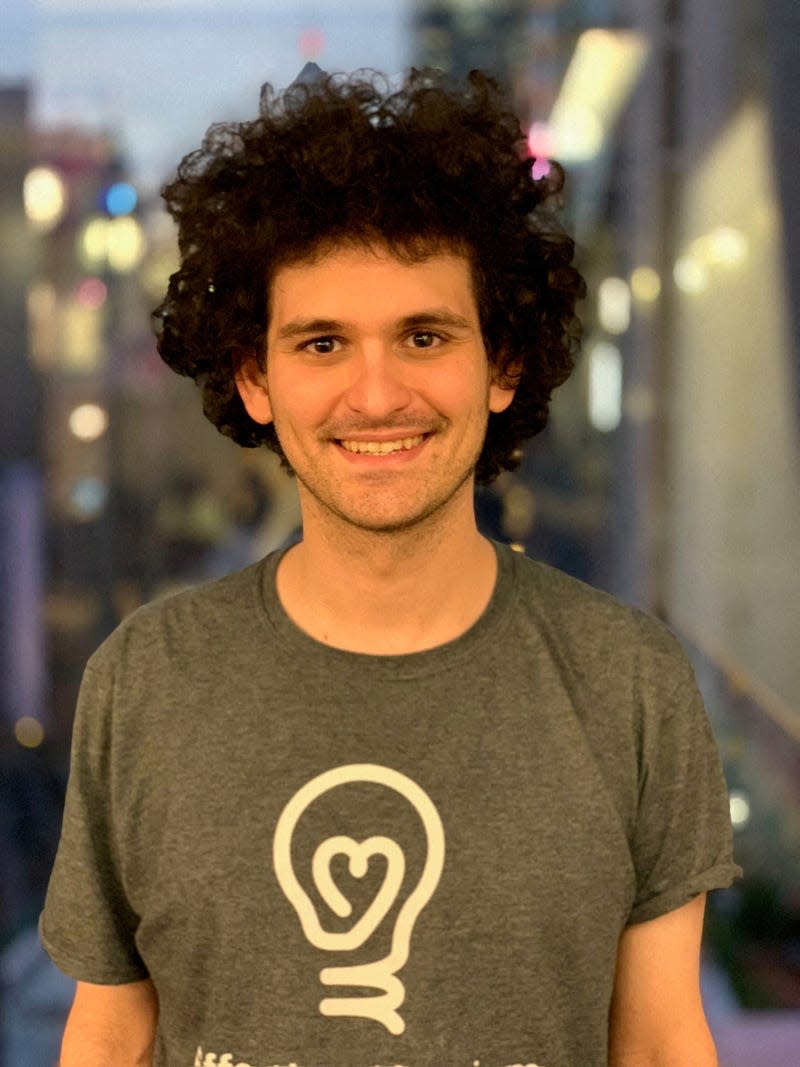Effective altruism solved all the problems of capitalism—until it didn't

- Oops!Something went wrong.Please try again later.
It’s hard to argue with the tenets of effective altruism. The movement, which began in the UK in 2009 and quickly spread, particularly among America’s tech glitterati, holds that we should spend our lives trying to help the most people we can, in the most effective ways possible. So far, so laudable.
But the downfall of crypto exchange FTX and its founder Sam Bankman-Fried, one of the most prominent effective altruists, have exposed some of the problems with the thinking behind the philosophy and how it’s being practiced.
Read more
One method at the center of effective altruism (EA) urges its followers to make as much money as possible, so that they can devote a large part of their riches to helping humanity: an idea called “Earn to give.”
But while that mission might be purely altruistic, there’s another way of seeing it: As a get-out-of-jail-free card to people who want to put vast wealth creation at the centre of their lives. It allows such people to ignore, if they wish, the fraying edges of the neoliberal order: The widening gaps between rich and poor, for instance, or the destruction of the environment. And while they’re giving away a lot of their wealth, they aren’t doing it at the expense of personal luxury. Not only does ‘earn to give’ ignore the problems at the heart of the prevailing economic system, it supercharges capitalism. It hints that capitalism isn’t only the best way to live, or the only way to live, but also a just way to live.
EA carries a seductive message
EA holds that while we can’t easily solve all the world’s problems, we could certainly alleviate the greatest suffering if we chose wisely where to direct our efforts. And certainly some of the efforts of EA have improved lives. As of 2022, Against Malaria Foundation had received $58 million from Open Philanthropy, an EA-influenced funder founded by Dustin Moskovitz, a co-founder of Facebook, and his wife, the former journalist Cari Tuna. Providing deworming medicine for children in poor countries has been put on the agenda and funded, in large part, by effective altruists. There’s nothing glitzy about these causes. Here, money effected real change.
The ideological fountainhead of EA is William MacAskill, who as a philosophy undergraduate at Oxford in 2009, formed his first ideas about how to do the most good possible. MacAskill’s thesis led to the formation of several organizations, including the Centre for Effective Altruism. MacAskill has written several books about the movement. In them, he advances another central idea: “ longtermism,” a framework of thought in which effective altruists weigh the good they can do by adding up the number of people who benefit—not just those alive today, but also those yet to be born. In that calculation, speculative worries about the future—such as the risks of rogue AI—can trump clear and present dangers like cholera or deforestation.
A conversation between MacAskill and Bankman-Fried is credited with propelling the FTX founder into his subsequent career in trading, and then cryptocurrency. MacAskill also worked for Bankman-Fried’s charitable enterprises. After FTX’s collapse, MacAskill tweeted that he “will have much to reflect on” if it turns out FTX misused funds. He didn’t respond to a request for comment from Quartz.
What’s the future for EA?
The collapse of FTX raises practical and moral questions about the uncertain future of EA. If taking huge risks—for example, with other people’s money—leads to huge financial gains for good causes, are those risks justified? Are they justified so long as they pay off—resulting in massive charitable giving, say—but unjustified when they don’t?
There are other signs of cracks and divisions within EA. Scholars like Carla Zoe Cremer at Oxford have raised the concern that the many of EA’s greatest beneficiaries are other EA organizations. They’ve also flagged that those receiving funding from effective altruists may be scared to criticize EA, lest they lose support. Finally, there is a tension between longtermism and helping people today, with the movement as a whole potentially leaning towards speculative “futureproofing,” even as some call for the mitigation of suffering that is actually already taking place.
What’s the alternative to EA?
The challenge of how to do good is a huge one. Free-market capitalism hasn’t delivered. The world’s poor are now subject to the worst of climate change, brought about by rapacious development and consumerism by the rich. As a result, many thinkers have proposed that we move beyond traditional capitalism to something more communal, which takes into account all the stakeholders along a long and complex chain.
But ‘earn to give’ promises something else. If our goal is to earn as much as we possibly can, it doesn’t matter—the argument can be made—whether we earn that money through cryptocurrency or roulette, or a mixture of the two. The lure of massive personal wealth is baked into the movement, bringing with it precisely the kinds of problems—like huge emissions, in the case of FTX and crypto—that EA claims to want to solve. The logic of EA doesn’t hold up if the system in which you’re operating is the problem in the first place.
More from Quartz
Sign up for Quartz's Newsletter. For the latest news, Facebook, Twitter and Instagram.

